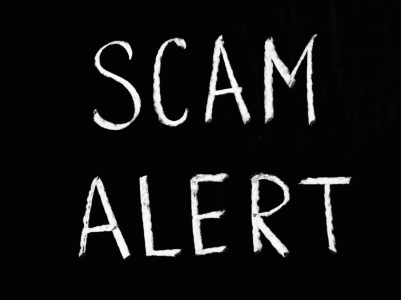7 sneaky scams draining bank accounts—how to protect yourself now
By
Veronica E.
- Replies 0
Scams are getting smarter—and sneakier.
What once came in the form of suspicious emails now shows up as friendly text messages, fake charity requests, or even phony job offers.
If you're not on guard, your hard-earned money could disappear before you realize anything’s wrong.
Here at The GrayVine, we believe staying informed is the best defense.
So let’s walk through seven common scams threatening your bank account today—plus simple ways to stop them in their tracks.

1. Overpayment scams: when too much is a warning sign
Selling something online? If a buyer sends you a check for more than the agreed amount and asks you to wire back the difference, be cautious.
These checks are almost always fake—and once they bounce, you’ll be stuck covering the loss.
Protect yourself:
2. Phishing attacks: fake bank alerts
A message shows up saying your bank account is locked or your credit card was used suspiciously.
But the message didn’t come from your bank—it came from a scammer trying to get your account info.
Protect yourself:
Also read: Could your next hotel reservation be at risk? What travelers need to know about this growing scam
3. Fake charities: Pulling on heartstrings and wallets
After disasters or around the holidays, scammers pose as charities to collect donations.
Some pretend to be well-known nonprofits—others make up entirely fake causes.
Protect yourself:
4. Mobile payment fraud: the digital pickpocket
Scammers are increasingly targeting apps like Venmo, Zelle, or Cash App.
You might receive a message from a friend asking for money urgently—or so you think. In reality, their account may have been hacked.
Protect yourself:
Also read: Bitcoin scam nearly cost a 73-year-old $20,000—here’s how she was saved
5. Online loan scams: "fast cash" traps
In need of a quick loan? Scammers are banking on that.
They promise instant approvals and low-interest loans, then ask for your banking info or a processing fee upfront. Once they get what they want, they disappear.
Protect yourself:
Also read: A warning text led to this costly mistake—how one couple lost over $80K in a shocking scam
6. Job scams: offers that come at a cost
These scams often target job seekers—especially retirees or those seeking flexible work.
A company might “hire” you quickly, then ask for a payment to cover training or equipment. Once you pay, the job vanishes.
Protect yourself:
Also read: Maryland man loses $40K to convincing scam—here’s how to protect yourself
7. Lottery scams: "You’ve won!"—but have you?
Scammers love to say you've won a sweepstakes or foreign lottery—usually one you never entered.
They send a check and ask for fees or taxes to be wired back. That check will bounce, and you’ll be out the money.
Also read: How a $50K scam fooled a finance expert—and what it means for the rest of us
Protect yourself:
If it feels off, trust your gut
Scams thrive on urgency and confusion. But you can slow things down, ask questions, and check with someone you trust.
Basic tips to keep your account safe:
Also read: Discover the smart scam alert that could protect your bank account!
Act fast if you’ve been scammed
If you think you may have fallen for a scam, don’t wait:
In many cases, banks can recover funds or refund unauthorized charges—but only if you act quickly.
Unfortunately, scammers often see seniors as easier targets—believing they’re more trusting and less likely to report fraud.
But that doesn’t mean you have to be at risk.
Awareness is your best protection, and by staying informed, you're already a step ahead.

Have you ever been targeted by a scam? What tips would you offer to someone just learning how to spot red flags? Share your experiences in the comments—your story could save someone else from losing money.
What once came in the form of suspicious emails now shows up as friendly text messages, fake charity requests, or even phony job offers.
If you're not on guard, your hard-earned money could disappear before you realize anything’s wrong.
Here at The GrayVine, we believe staying informed is the best defense.
So let’s walk through seven common scams threatening your bank account today—plus simple ways to stop them in their tracks.

Staying informed about common scams is one of the best ways to protect your finances. Image Source: Pexels / Anna Tarazevich.
1. Overpayment scams: when too much is a warning sign
Selling something online? If a buyer sends you a check for more than the agreed amount and asks you to wire back the difference, be cautious.
These checks are almost always fake—and once they bounce, you’ll be stuck covering the loss.
Protect yourself:
- Never wire money to someone you don’t know.
- Talk to your bank before depositing any check that feels off.
- Double-check the sender’s details—if it’s a dental clinic from another state, that’s a clue something’s wrong.
2. Phishing attacks: fake bank alerts
A message shows up saying your bank account is locked or your credit card was used suspiciously.
But the message didn’t come from your bank—it came from a scammer trying to get your account info.
Protect yourself:
- Don’t click on suspicious links or respond to emails asking for personal info.
- Call your bank using the number on your card, not one sent in the message.
- Your bank will never ask for sensitive information by text or email.
Also read: Could your next hotel reservation be at risk? What travelers need to know about this growing scam
3. Fake charities: Pulling on heartstrings and wallets
After disasters or around the holidays, scammers pose as charities to collect donations.
Some pretend to be well-known nonprofits—others make up entirely fake causes.
Protect yourself:
- Only donate through official charity websites or trusted platforms.
- Verify the organization through sites like Charity Navigator or the Better Business Bureau.
- Never give out financial information over the phone to unsolicited callers.
4. Mobile payment fraud: the digital pickpocket
Scammers are increasingly targeting apps like Venmo, Zelle, or Cash App.
You might receive a message from a friend asking for money urgently—or so you think. In reality, their account may have been hacked.
Protect yourself:
- Always verify money requests with a phone call or message through another app.
- Never send money to someone you don’t personally know.
- Use two-factor authentication for your payment apps whenever possible.
Also read: Bitcoin scam nearly cost a 73-year-old $20,000—here’s how she was saved
5. Online loan scams: "fast cash" traps
In need of a quick loan? Scammers are banking on that.
They promise instant approvals and low-interest loans, then ask for your banking info or a processing fee upfront. Once they get what they want, they disappear.
Protect yourself:
- Research lenders through the Better Business Bureau or trusted financial review sites.
- Never pay any upfront fee for a loan.
- Be wary of any offer that pressures you to act immediately.
Also read: A warning text led to this costly mistake—how one couple lost over $80K in a shocking scam
6. Job scams: offers that come at a cost
These scams often target job seekers—especially retirees or those seeking flexible work.
A company might “hire” you quickly, then ask for a payment to cover training or equipment. Once you pay, the job vanishes.
Protect yourself:
- Real employers don’t ask for payment upfront.
- Research the company independently, and don’t rely on links provided in the message.
- Be skeptical of offers that seem too good to be true or arrive unsolicited.
Also read: Maryland man loses $40K to convincing scam—here’s how to protect yourself
7. Lottery scams: "You’ve won!"—but have you?
Scammers love to say you've won a sweepstakes or foreign lottery—usually one you never entered.
They send a check and ask for fees or taxes to be wired back. That check will bounce, and you’ll be out the money.
Also read: How a $50K scam fooled a finance expert—and what it means for the rest of us
Protect yourself:
- If you didn’t enter, you didn’t win.
- Never send money to claim a prize.
- Know that participating in foreign lotteries by mail or phone is illegal in the US.
If it feels off, trust your gut
Scams thrive on urgency and confusion. But you can slow things down, ask questions, and check with someone you trust.
Basic tips to keep your account safe:
- Don’t give out personal or financial info unless you’re sure who you’re talking to.
- Review your bank and credit card statements regularly.
- Set up alerts with your bank for unusual activity.
- Use strong passwords and update them regularly.
Also read: Discover the smart scam alert that could protect your bank account!
Act fast if you’ve been scammed
If you think you may have fallen for a scam, don’t wait:
- Contact your bank immediately to freeze your account if needed.
- Report the scam to the Federal Trade Commission at ftc.gov or 877-382-4357.
- File a report with your local police department, especially if money was stolen.
In many cases, banks can recover funds or refund unauthorized charges—but only if you act quickly.
Unfortunately, scammers often see seniors as easier targets—believing they’re more trusting and less likely to report fraud.
But that doesn’t mean you have to be at risk.
Awareness is your best protection, and by staying informed, you're already a step ahead.
Key Takeaways
- Scams like overpayment fraud, fake job offers, and phishing messages are among the most common threats to bank accounts today.
- Many scams target older adults, but knowledge, caution, and verification can help prevent falling victim.
- Never share personal or banking information unless you’re absolutely sure who you’re talking to.
- If you believe you’ve been scammed, act quickly: contact your bank, file a report with the FTC, and stay vigilant for further attempts.
Have you ever been targeted by a scam? What tips would you offer to someone just learning how to spot red flags? Share your experiences in the comments—your story could save someone else from losing money.






